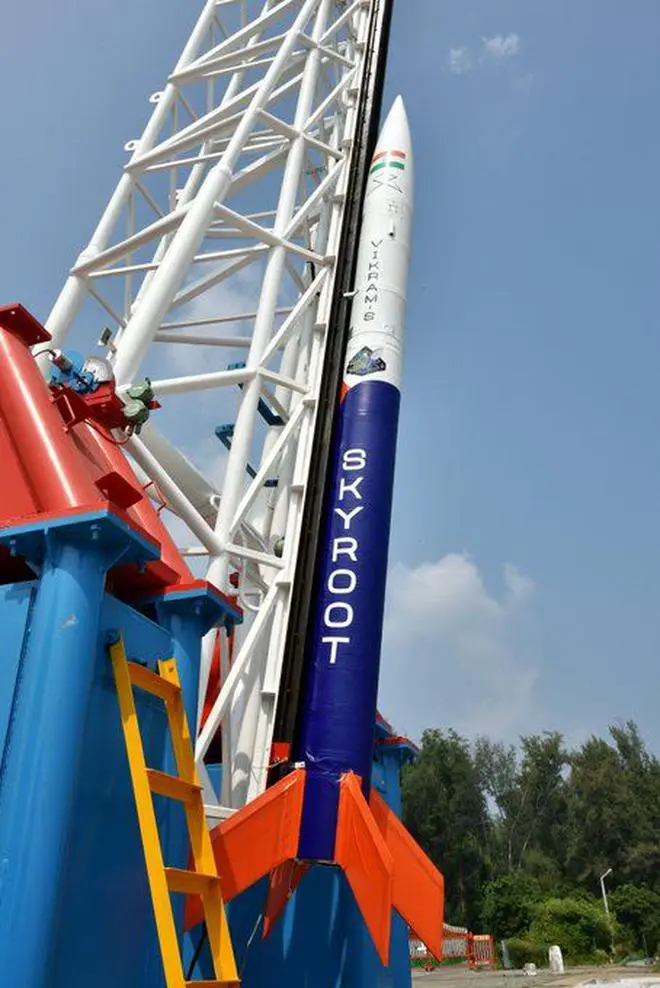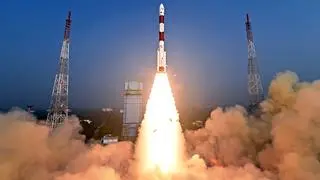Indian Space Research Organisation (ISRO) is all set to make history on Friday when it launches the first-ever private rocket, setting a new milestone in the 75 years journey of independent India.
The Hyderabad-based space startup Skyroot Aerospace’s rocket Vikram-S with three small satellites is scheduled for launch on November 18 at 11.30 a.m. The ‘Prarambh’ mission carries three customer payloads equipped with sensors for the measurement of acceleration and pressure.
Related Stories
Report pegs geospatial economy at ₹61,000 cr by 2025
Easy access for stakeholders to geospatial knowledge key: ShekawatThe mission’s aim is to launch Vikram–S (VKS), a single-stage solid fuelled sub-orbital rocket into space. The launch vehicle has been named ‘Vikram-S’ as a tribute to the father of the Indian space programme, the late Vikram Sarabhai.
Indian National Space Promotion and Authorization Center (IN-SPACe), Department of Space (DOS), on Wednesday, authorised for the launch on Friday.

Vikram-S rocket integrated to the launcher.
It took nearly two years for Skyroot to build the rocket using carbon composite structures and 3D-printed components. Founded by Pawan Kumar Chandana and Naga Bharath Daka in 2018, the company has 200 employees, and is the largest funded private space start up in India with ₹526 crore raised as capital till date.
Union Minister Jitendra Singh, will be in Sriharikota to witness the historic launch of Vikram-suborbital (VKS) rocket, said, “the launch will herald a level-playing field for cost-efficient satellite launch services by disrupting the entry barriers.”
Related Stories
Now, companies globally are out to pluck money from space
From ‘ash releases’ to experiments and data banks, there’s much happening outside EarthThe launch will be a major milestone in the ISRO’s journey, after Prime Minister Modi unlocked the Space Sector in 2020 for private participation. Skyroot was the first StartUp to sign a MoU with ISRO for rocket launch, he said.
Skyroot’s rocket is a single stage spin stabilised solid propellant rocket with mass of around 550 kg. It can reach a maximum altitude of 101 km and splashes into the sea and the overall launch duration will be around 300 seconds.
Space reforms have unleashed innovative potentials of StartUps and within a short span of time, from a couple of Space Start-ups three -four years back, there are 102 working on areas like space debris management, nano-satellite, launch vehicle, ground systems and research. With the integration of R&D, Academia and Industry with equal stake, it is safe to say that a space revolution led by ISRO along with the private sector and start-ups is on the horizon, the minister said.







Comments
Comments have to be in English, and in full sentences. They cannot be abusive or personal. Please abide by our community guidelines for posting your comments.
We have migrated to a new commenting platform. If you are already a registered user of TheHindu Businessline and logged in, you may continue to engage with our articles. If you do not have an account please register and login to post comments. Users can access their older comments by logging into their accounts on Vuukle.